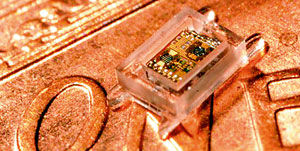Scientists have created the world's smallest computer system to help treat glaucoma patients.
At just one square millimetre in size, the tiny device is a pressure monitor that is implanted in a person's eye. It may be small but it packs a hefty punch, containing an ultra low-power microprocessor, a pressure sensor, memory, a thin film battery, a solar cell and a wireless radio with an antenna that can transmit data to an external reader device.
Developed by researchers at the University of Michigan, the unnamed unit -- which is expected to be commercially available in several years -- is already being touted as the future of the computing industry. Its creators -- Professors Dennis Sylvester, David Blaauw and David Wentzloff -- claim that as the device's radio needs no tuning to find the right frequency it could link to a wireless network of computers. A network of such units could one day track pollution, monitor structural integrity, perform surveillance, or make virtually any object smart and trackable, according to the scientists.
 |
| World's smallest computer system: At just one square millimetre in size, the tiny device is a pressure monitor that is implanted in a person's eye |
Professor Sylvester said: 'When you get smaller than hand-held devices, you turn to these monitoring devices. 'The next big challenge is to achieve millimetre-scale systems, which have a host of new applications for monitoring our bodies, our environment and our buildings.
'Because they're so small, you could manufacture hundreds of thousands on one wafer.
'There could be tens to hundreds of them per person and it's this per capita increase that fuels the semi-conductor industry's growth.' The researchers' computer system is currently a pressure monitor designed to be implanted in the eye to continuously track the progress of glaucoma, a potentially blinding disease.
The processor in the eye pressure monitor is the third generation of the researchers' Phoenix chip, which uses a unique design and an extreme sleep mode to achieve ultra-low power consumption.
The newest system wakes every 15 minutes to take measurements and consumes an average of 5.3 nanowatts. To keep the battery charged, it requires exposure to ten hours of indoor light each day or 1.5 hours of sunlight. It can store up to a week's worth of information.
While this system is miniscule and complete, its radio doesn't equip it to talk to other similar devices, which is an important feature for any system targetted towards wireless sensor networks.
The researchers are confident their miniature device will take off. They cite the concept of Bell's Law - that a new breed of smaller, cheaper computers arises each decade.
This theory is upheld by the personal computers of the 1980s turning into the laptops of the 1990s, and those into the smartphones of the new millemium.
Professor Sylvester said: 'This is the first true millimetre-scale complete computing system.
'Our work is unique in the sense that we're thinking about complete systems in which all the components are low-power and fit on the chip. We can collect data, store it and transmit it. 'The applications for systems of this size are endless.'
© Daily Mail, London
|


